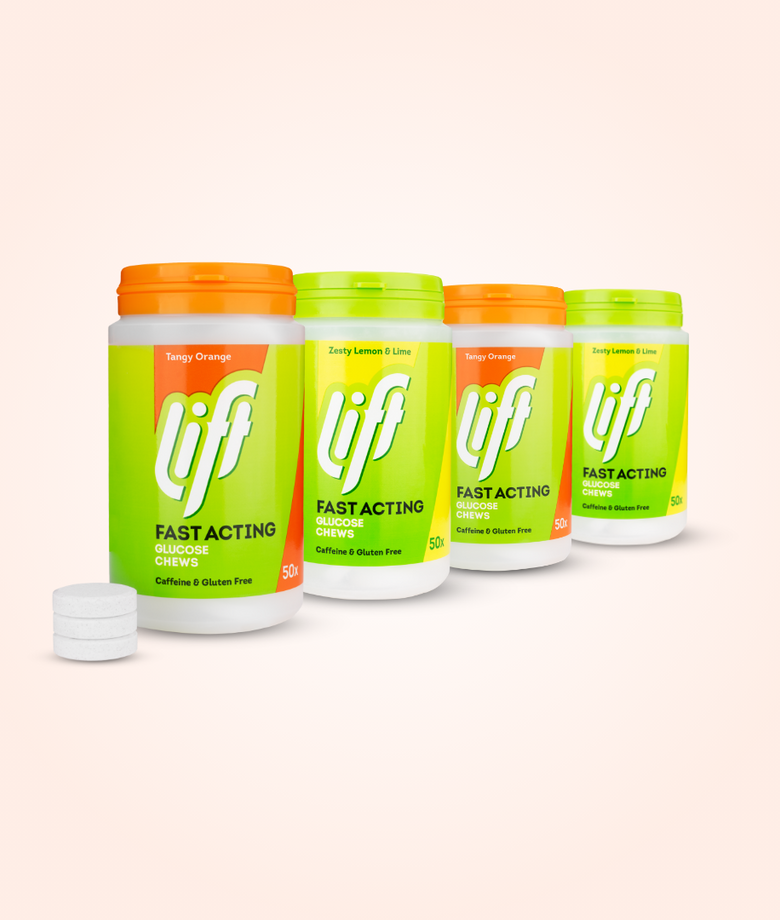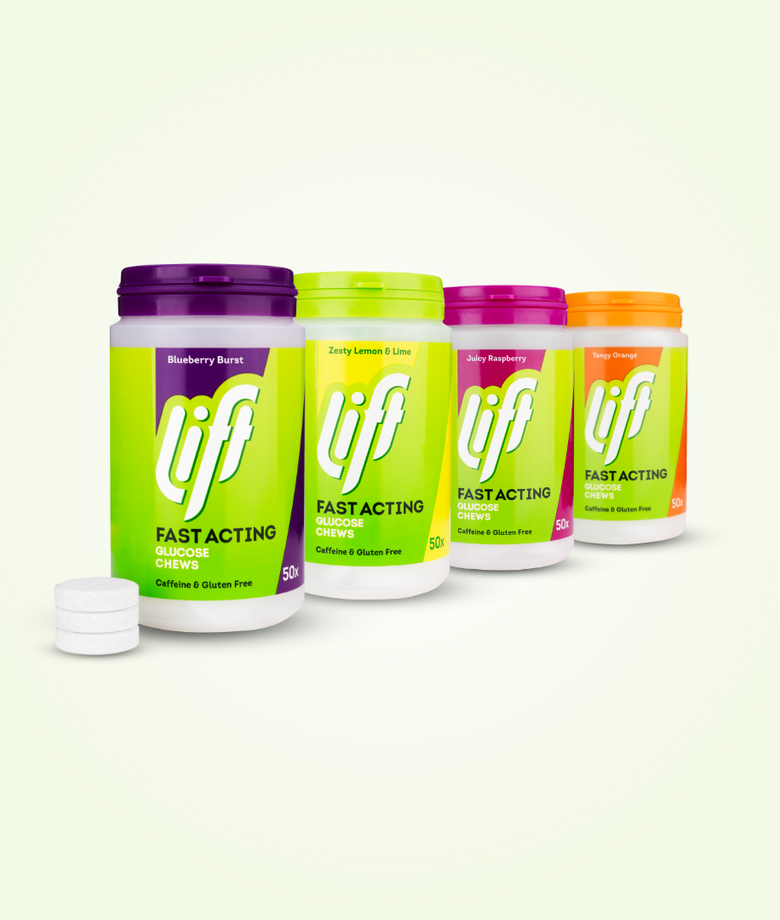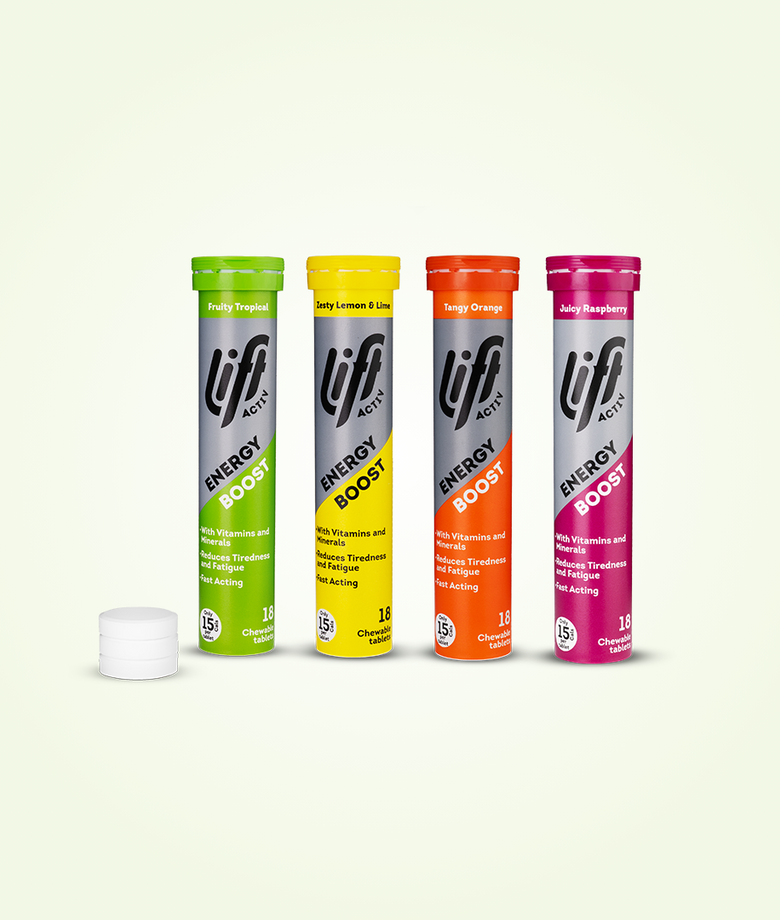Sports Supplements: Energy Drinks vs Glucose Tablets
Athletes in many sporting pursuits use energy drinks to supplement their performance, but there are situations when glucose tablets might be a beneficial alternative. If a sportsperson is diabetic, for instance, they may need to avoid energy drinks that are high in sugar. While these drinks may increase alertness and create a feeling of high energy, their ingredients are not designed for cellular energy production or to provide fuel quickly.1 Endurance athletes such as marathon runners, rowers and long-distance cyclists may also find that glucose tablets are more effective, more convenient and more precise than energy drinks.
Energy Drinks vs Sports Drinks
It is important to clarify that this article is referring to energy drinks high in sucrose and caffeine as a distinct category separate from sports drinks that contain glucose and sodium. Sports drinks are effective for rehydration during intense exercise, as their formulations are designed to replace isotopes and sodium lost through sweat. Energy drinks, on the other hand, are designed to increase alertness and, because of their caffeine content, are likely to cause dehydration. Because they are frequently sold together in shops, you might think that they are similar products, but energy drinks have almost opposite effects to sports drinks in terms of physiology.
What is Glucose?
Glucose is a simple sugar or monosaccharide or simple sugar, normally gained by digesting carbohydrates.
Cells in the body need a supply of glucose to generate energy. This is either delivered in the bloodstream (blood sugar) or developed from glycogen stores in the muscles or liver.
Cell respiration is the process by which our cells create energy:
Glucose + Oxygen → Energy + Heat + Carbon Dioxide.
This is the energy used by every cell in the body to perform metabolic and biological functions, including powering muscle cells during physical exercise. Energy is also needed to repair muscles and maintain mental function.
When we run low on glucose, we can’t create more energy, no matter how much we push our muscles. We need to resupply in order to continue, but usually this can take more than an hour.
Taking glucose supplements removes the need for digestion of carbohydrates into glucose. The raw glucose molecules can be absorbed into the bloodstream straight from the stomach, providing fuel to cells within fifteen minutes.
Are Energy Drinks a Good Source of Glucose?
Most energy drinks contain refined sugar or sucrose, as well as caffeine, sodium and stimulants such as taurine.
The high amounts of sugars in most energy drinks on the market are present as sucrose or fructose.1 Sucrose breaks down into glucose and fructose in the small intestine. However, it takes at least 90 minutes for any food to reach this part of the digestive tract, meaning sucrose does not provide the immediate raise in blood sugar required to delay fatigue during endurance sports.
Instead, the feeling of high energy is provided by caffeine and other legal stimulants such as taurine. Caffeine does not contribute to energy production in the cells, or provide energy to the muscles. Instead, it acts in the brain to block neuroreceptors that alert us to fatigue and low energy stores.2 It makes us feel alert, without providing any energy to back up the activity.
Glucose Tablets vs Energy Drinks
There are many reasons why athletes should consider glucose supplements ahead of energy drinks for replenishing blood sugar during a workout. Here we discuss a few of the key advantages of glucose tablets over energy drinks.
No Complex Sugars: Instant Energy
Ingesting pure glucose in glucose tablets allows this simple sugar to be absorbed into the bloodstream as soon as it enters the stomach, raising the blood sugar in minutes. This provides your cells with fuel for energy production straight away.
No Caffeine
As well as a stimulant, caffeine is also a powerful diuretic, causing water and sodium losses through urine.1 Using caffeinated drinks to fuel intense exercise can lead to glycogen depletion and dehydration and sodium imbalance.1 It is counter-productive to use high-caffeine energy drinks for exercise.
Some people experience negative side effects of caffeine, including insomnia and nervousness,3 along with diarrhoea and heart palpitations,4 headaches and reduced insulin sensitivity.1
Glucose tablets contain no caffeine or sucrose, just glucose. They give your cells fuel to create real energy, rather than tricking your body into feeling energetic.
Precise Glucose Dosing
When you sip an energy drink, how much glucose are you ingesting? It’s not easy to know. While the whole 500ml bottle might contain 25g carbohydrates, it is difficult to estimate when the glucose will be accessible to your cells if it is not already in a simple form.
Glucose tablets provide a precise amount of glucose, so athletes can calculate the right amounts at the right moments to maximise their sporting potential.
Lift Glucose chews contain 3.7g of glucose and 15 calories per tablet, while Lift Glucose juice shots have 15g of glucose and 57 calories.
Easy to Carry
Energy drinks can be bulky, and on a long-distance run there is no way to carry them easily. Glucose tablets, on the other hand, are contained in a small, tough plastic case. You don’t need to stop and drink. Instead, you can simply chew one while you run. Lift glucose tablets can fit easily inside your gym bag for quick and easy access.
A Clear Winner: Glucose > Energy Drinks
In conclusion, choosing glucose tablets over energy drinks can significantly benefit athletes during workouts. Glucose tablets offer precise dosing, enabling athletes to calculate the right amounts at the right times for optimal performance. They are easy to carry, fitting conveniently in a gym bag for quick access. Unlike energy drinks, glucose tablets provide instant energy as they deliver pure glucose directly to the bloodstream without the need for complex digestion. Moreover, glucose tablets are free from caffeine, avoiding potential negative side effects and dehydration caused by caffeinated energy drinks. By opting for high-quality glucose tablets, athletes can fuel their cells with real energy, maximizing their sporting potential without compromising their well-being.
- Alsunni AA. Energy Drink Consumption: Beneficial and Adverse Health Effects. Int J Health Sci (Qassim). 2015;9(4):468-474.
- Institute of Medicine (US) Committee on Military Nutrition Research. Caffeine for the Sustainment of Mental Task Performance: Formulations for Military Operations. Washington (DC): National Academies Press (US); 2001. 2, Pharmacology of Caffeine. Available from: https://www.ncbi.nlm.nih.gov/books/NBK223808/
- Salinero, J. J., Lara, B., Abian-Vicen, J., Gonzalez-Millán, C., Areces, F., Gallo-Salazar, C., Ruiz-Vicente, D., & Del Coso, J. (2014). The use of energy drinks in sport: perceived ergogenicity and side effects in male and female athletes. The British journal of nutrition, 112(9), 1494–1502. https://doi.org/10.1017/S0007114514002189
- NHS Fife, Caffeine (pamphlet), 2020, May, Available from: https://www.nhsfife.org/media/35076/caffeine-handout.pdf






